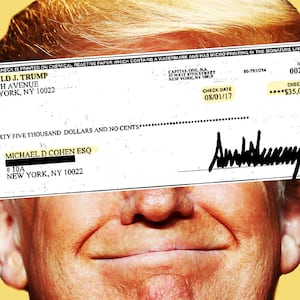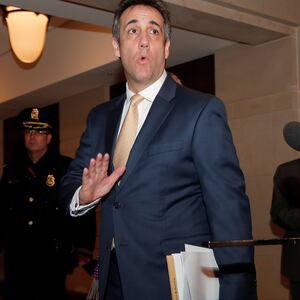Michael Cohen’s testimony to Congress about Donald Trump’s failed attempt to buy the Buffalo Bills football team barely registered in the news. I can see why: By my count, Cohen’s testimony pointed to at least 14 Trump crimes.
But the Bills story is illustrative and worth dwelling on. It establishes how Trump is the patron saint of fake news as well as a con artist grubbing for cash because his billions of dollars exist only in his imagination.
What Trump does is spend enough money to create the appearance of being a billionaire, something I’ve been reporting since I got hold of his financial statement in 1990, which showed he was no billionaire.
ADVERTISEMENT
Trump’s financial fakery is good enough to fool millions of Americans, but not the members of the most exclusive rich people’s club in America, the National Football League team owners. They also were not fooled by Trump’s planting fake news that the Bills were about to move to Toronto, as we shall see.
Cohen, Trump’s personal lawyer for more than a decade, gave three years of Trump’s summary financial statements to the House Oversight and Reform Committee. These were not certified statements examined by auditors, but mere compilations and naked claims, one of many glaring signs that Trump just makes up his numbers.
In 2013 Trump claimed a net worth of almost $8.7 billion, up from $4.6 billion the year before.
That fantastic increase was not the result of Trumpian deal making. Instead, Trump simply added a line for the value of his brand, which is his last name. He put down $4 billion.
I get that. My full name, unique as far as I know among all seven billion humans, is my brand. It's helped me to make a nice living and travel around the world and raise eight kids. My brand’s worth is $3 billion. At least. Prove otherwise.
Of course, there are ways to measure the actual value of assets, including brands—a synonym for reputation. Bankers and the IRS apply these financial tools every day. One measure is how much cash flows from an asset. It’s common to measure how much cash or profit flows from one brand, compared to a competitor, to establish asset value.
At a 5 percent annual return–Trump would call that a loser’s return–he should enjoy more than $430 million of increase a year for a number of years. That’s easily enough to buy an NFL team, which lately have been selling in the $800 million to $1.1 billion range.
Why, then, would Trump need to borrow money from Deutsche Bank to buy the Buffalo Bills? Though the franchise was purchased in 2014 for a reported $1.4 billion by Terry and Kim Pegula, Forbes ranks the Bills dead last in valuation among all 32 league teams at $1.6 billion. Why would he need to inflate his net worth?
Trump tried to force his way into the bidding by spreading stories that the team would be moved to Toronto unless he got it. This was big news in Western New York where I live, pushed by something called 12th Man Thunder.
12th Man Thunder was a Trump invention to spread fake news. Michael Caputo, a Buffalo publicist who later worked on the 2016 Trump campaign, has acknowledged that Trump was the driving force behind the 12th Man campaign.
“Mr. Trump was convinced that the community wouldn’t stand for a move, so he sent me off to try and organize something with local fans to get that rolling,” Caputo told the Associated Press in 2017.
Charles Pellien, one of the fake group’s leaders, told the AP, “I just wanted to blurt out, ‘Donald Trump is behind this!’” But he couldn’t because Trump demands that those who do his dirty work, including planting fake news, sign lifetime nondisclosure agreements.
Trump once owned a spring league football team, the New Jersey Generals. The idea of a spring league was smart, a growing success until Trump persuaded the United States Football League to file an antitrust lawsuit against the NFL in 1986. The USFL won in theory, but a jury awarded the league $1, though with treble damages and interest it cost the NFL $3.27. The spring league immediately collapsed.
Trump’s animus for the NFL also showed up when he insisted that his three debates with Hillary Clinton were manipulated by the NFL to occur when football games were being televised.
“I’ll tell you what I don’t like. It’s against two NFL games. I got a letter from the NFL saying, ‘This is ridiculous,'” Trump said on ABC’s This Week on July 31, 2016.
That was more Trump fake news. Brian Stelter of CNN’s Reliable Sources, who covers journalism, showed with verifiable facts that this was another Trump concoction. Stelter also tweeted that the NFL’s chief spokesperson told him in writing that “we did not send a letter to Trump.”
In the end, Trump did not submit a final bid. NFL owners, a legal cartel, decide who can buy teams and if and when they can be moved to a new city, local fans be damned. That shows that 12th Man was not just a source of fake news, but a diversion. As Deadspin, a sports website, put it when the Bills sale was underway, “Trump is a clownfraud who only got involved in this for the attention.”
The NFL also requires a background check on prospective team owners. Trump likely would have failed such an inquiry given his lifelong history of criminal associations, especially the business deals and favors he did for the international cocaine trafficker Joseph Weichselbaum, all documented from the public record in my 2016 book The Making of Donald Trump.
Australian gambling regulators long ago deemed Trump unfit to own a casino because of his extensive criminal ties.
These facts, like what Cohen revealed about the Bills purchase scam, have hardly made the news.
As for the financial muscle needed to buy the Bills, NFL rules allow a group of investors to buy a team. The general partner must own at least 30 percent and can have no more than 24 limited partners. Debt is limited to $350 million.
To make the Pegula price, Trump would have needed $315 million in cash, a $350 million loan and, assuming the maximum 24 partners, each would have had to pony up almost $31 million.
Trump made clear he would be the sole buyer, however. So that would have required more than $1 billion in cash.
Voters in 2016 might have thought Trump could do that. After all, he claimed he was worth $8.7 billion the day he announced, then put out a document claiming more than $10 billion. As with the financial statements provided by Cohen, these were naked claims.
Almost 90 percent of that claimed wealth vanished when Trump took office and filed his first Office of Government ethics disclosure form as president.
Significantly, Trump’s lawyers asked that he be allowed to file his financial disclosure form without signing under penalty of perjury. That request was denied.
Trump made at least one false statement on his form for 2017. A serious congressional investigation will, for sure, show that many of the values on his form are inflated. Congress may also uncover additional debts because the ethics disclosure rules were not written to apply to career white collar criminals experienced at concealing their true finances, as Trump himself has, in his own way, said almost four years ago.
“This report was not designed for a man of Mr. Trump’s massive wealth,” he said in a statement referring to a different federal disclosure form.
The statements Cohen released also show that Trump in 2012 claimed his Westchester County mansion was worth $291 million. Earlier he had listed it at $7 million and later at under $50 million. The most expensive home sold in America before 2013, excluding vast ranches, was priced at $117 million. Under oath in 2007, when suing author Tim O’Brien for putting his net worth at under $200 million, Trump said he had no appraisal on which to base the home’s value, just his belief that it had soared.
“My net worth fluctuates, and it goes up and down with markets and with attitudes and with feelings, even my own feelings," Trump said when questioned by O’Brien’s lawyers. Trump lost his libel lawsuit. The point here is that when it comes to wealth, Trump just makes it up. He’s no more a billionaire than I am.
Creating a lifestyle that lets him pose as a billionaire costs less than $12 million annually, I estimate. And he achieves that not through building wealth, but through his work as a financial locust who devours other people’s money through moving from one shady deal to the next. Along the way he cheats banks, investors, workers, and governments at all levels.
When we see Trump’s tax returns, as we can expect to soon thanks to a 1924 anti-corruption law, you can get bet his income won’t support a net worth anywhere near even one billion dollars. And don’t be surprised if his net worth turns out to be less than zero, as Trump was forced to admit in 1990 when I reported that his net worth was negative $295 million, meaning that you are probably worth more than Donald Trump.
He may have conned America, but he couldn’t con the NFL, and thanks to Robert Mueller and the Southern District of New York and the Democrats in Congress, it looks like the con on the country is about to come to an end, too.







